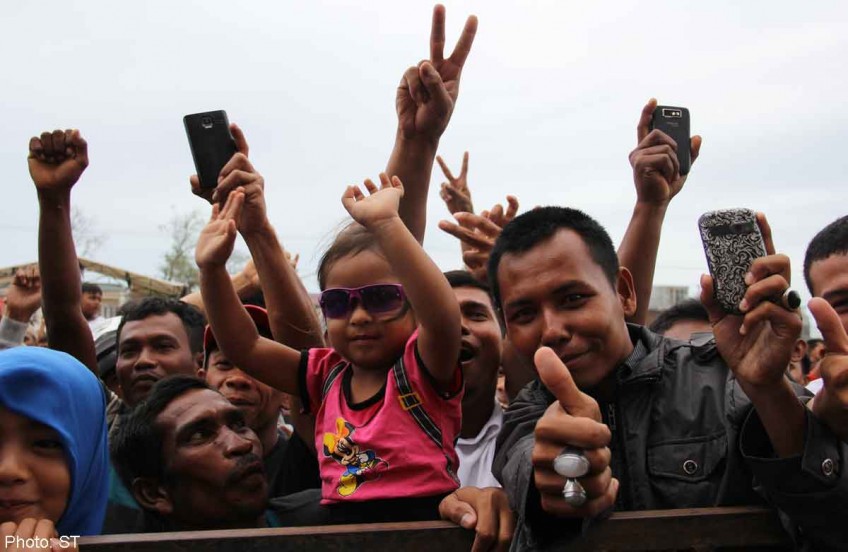Indonesian elections 2014: Banned, but vote-buying still plagues election process

JAKARTA - When lawyer Taufik Basari visited constituents in his Jakarta district to distribute leaflets telling them why he deserved their vote, many asked him why the envelope was missing.
"Some residents opened the fold of the leaflet, expecting to find money, and asked 'Pak, where is the envelope?'," said the 37-year-old first-time legislative candidate for the National Democratic Party (NasDem).
"They are still expecting cash or generous handouts of groceries. But I tell them, a political office is a mandate. That cannot be bought - it is priceless."
His experience is not unusual. A recent survey by the Indikator Politik Indonesia found that four out of 10 Indonesians still find it acceptable for politicians to hand out money or staples like rice or oil, as part of campaigning.
A third of these said their vote would go to the candidate who did that.
Indeed, despite a ban on vote-buying, chances are it will surface again in this year's election campaign.
In 2009, vote-buying was the top violation recorded by police, making up a third of all election-related complaints.
Things may get worse this election as robust economic growth in recent years has filled campaign coffers to bursting with donations from tycoons for some candidates.
While there is a law capping the amount that an individual can contribute to candidates, analysts say enforcement is weak.
The result is that candidates flush with money are likely to ramp up efforts to woo voters with cash and kind.
Indonesia's law defines vote-buying as handing out cash or other items in an effort to influence votes.
The penalty is a maximum fine of 48 million rupiah (S$5,363) and four years' jail.
But tough sanctions alone will not be enough to guarantee a clean campaign, said Mr Abdullah Dahlan of Indonesia Corruption Watch (ICW), whose outfit campaigned in 15 of the country's 33 provinces recently to raise awareness about the issue.
"Our monitoring shows this practice is still widespread," he told The Straits Times. "People's mindsets have yet to change. Many find it odd if a politician doesn't give them something. It is a two-way street."
This expectation from voters certainly adds to the burden of candidates, who have to set aside money for "goodie bags" of food staples and cash handouts of about 50,000 rupiah to 100,000 rupiah for each individual on walkabouts.
[[nid:93748]]
For the 2009 legislative election, each candidate spent an average of 2 billion rupiah, according to associate research fellow Fitri Bintang Timur and senior research analyst Adhi Priamarizki of Singapore think-tank, the S.Rajaratnam School of International Studies.
The total campaign spending declared by parties this time has risen to nearly a trillion rupiah, compared to 298 billion rupiah in 2004 and 826 billion rupiah in 2009, they added.
In addition to direct handouts, politicians have also to decide whether to make use of agents purportedly claiming to be able to secure votes in exchange for money.
Mr Mufied Mubarok, who ran unsuccessfully in the 2009 legislative race, told of how he was approached by people offering him a win if he gave them 15,000- 20,000 rupiah per vote.
"Many were touting this service, guaranteeing 1,000 votes, but it was unclear who these voters are or what constituencies they belong to," he was quoted by Media Indonesia daily as saying.
There has been some pushback against vote-buying, with some clerics joining in.
Mr Yamin Hadad, head of the North Malukus chapter of the Indonesia Ulema Council, reportedly told his followers: "Whatever the reason, any form of money politics is banned, be it under the rule of the country's law or in religion."
Several non-governmental organisations like ICW are targeting young people, hoping that, in time, they will add to the number of voters who reject the idea of cash for votes.
First-time voters make up about 22 million, or 12 per cent of the 187 million voters this election.
Fresh graduate Lydia Agustina, 22, is among those helping ICW to organise roadshows in Jakarta aimed at young voters.
The NGOs have also set up a website - Bersih2014 - which highlights graft-free candidates. Its list of 100 candidates is tiny relative to the 6,600 candidates vying for 560 national parliamentary seats, but the NGOs are intent on getting their message out.
"In 2009, we listed the bad apples. This time, we reversed it to list the good ones," said Ms Agustina.
"It is a controversial idea because we should be neutral, but we tell people it is not meant to be an endorsement, but about sending a message that there are clean candidates."

Get a copy of The Straits Times or go to straitstimes.com for more stories.
[[nid:93748]]